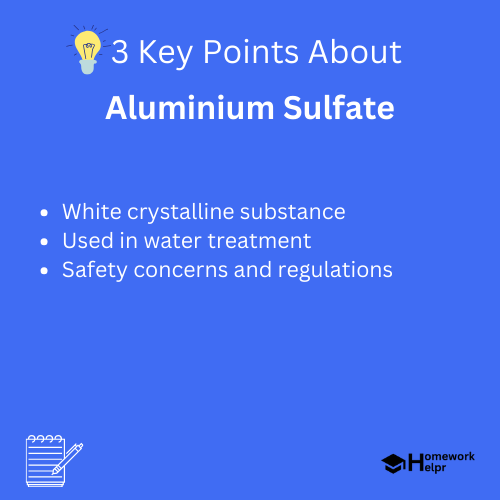📝 Summary
Aluminium sulfate, commonly known as alum, is a chemical compound with the formula Al2(SO4)3. It is a white crystalline substance that is highly soluble in water, making it valuable for several industrial applications like water treatment and food processing. The compound acts as a coagulating agent, helps in lowering water pH, and is significant in the pulp and paper and textile industries. However, awareness of its environmental impact and safety precautions during handling is essential to utilize its benefits responsibly.
Understanding Aluminium Sulfate
Aluminium sulfate, often referred to as alum, is a chemical compound comprised of aluminium, sulfur, and oxygen. Its chemical formula is Al‚ÇÇ(SO‚ÇÑ)‚ÇÉ. This compound plays a vital role in various industrial applications, and understanding its properties and uses can significantly enhance our knowledge of chemistry.
Definition
– Compound: A substance formed when two or more elements chemically bond together. – Chemical formula: A way of presenting information about the chemical proportions of atoms that constitute a particular chemical compound.
The Structure and Properties of Aluminium Sulfate
Aluminium sulfate appears as a white crystalline substance, often in powdered form. It is highly soluble in water, making it an excellent compound for various applications where solutions are necessary. When dissolved, it dissociates into three sulfate ions and two aluminium ions, which play significant roles in chemical reactions.
This compound has several noteworthy properties that are significant in industries. They include:
- High solubility in water.
- Effective coagulating agent in water treatment.
- Ability to lower the pH of water, making it more acidic.

Production of Aluminium Sulfate
Aluminium sulfate is produced by the reaction between aluminium hydroxide and sulfuric acid. The process can also involve the reaction of alumina with sulfuric acid in high temperatures. Here is the chemical equation representing the process:
Al(OH)‚ÇÉ + H‚ÇÇSO‚ÇÑ ‚Üí Al‚ÇÇ(SO‚ÇÑ)‚ÇÉ + H‚ÇÇO
The production techniques can vary based on desired purity levels and the intended use of the compound. For instance, industrial grade and food grade aluminium sulfate differ in purity and processing. Each type is selected for specific applications to ensure safety and effectiveness.
Examples
For instance, industrial grade aluminium sulfate is often used in wastewater treatment, while food grade may be utilized in food preservation methods.
Applications of Aluminium Sulfate
Aluminium sulfate is widely used in various industries. Here are some of the primary applications:
- Water Treatment: It is primarily known for its use in water purification as a coagulating agent. It helps to clump impurities together for easier removal.
- Pulp and Paper Industry: Used as a sizing agent in the production of paper to control water absorption.
- Textile Industry: Employed as a mordant in dyeing fabrics, helping to fix dyes onto fibres.
- Food Processing: Some forms of aluminium sulfate are used in food preparation, particularly in baking powder.
❓Did You Know?
Did you know that aluminium sulfate has been used since ancient times for various purposes including water purification and textile dyeing?
Environmental and Safety Considerations
While aluminium sulfate has many beneficial uses, it is essential to consider its environmental impact. Overuse or improper disposal can lead to environmental concerns, particularly in waterways where it can affect aquatic life. Therefore, regulations regarding its application and disposal are necessary.
From a safety perspective, aluminium sulfate is generally regarded as safe for many applications, but it can cause irritation to the skin, eyes, and respiratory tract. Proper handling and safety measures should be followed, including the usage of gloves and protective equipment when dealing with the compound in concentrated forms.
Definition
– Coagulating agent: A substance that promotes the clumping of particles, helping to remove impurities from liquids. – Mordant: A substance used to set dyes on fabrics or tissues.
Conclusion
In conclusion, aluminium sulfate is a versatile and useful compound in various industries, ranging from water treatment to food processing. Its beneficial properties and applications highlight the importance of chemical compounds in our daily lives. However, it is crucial to be aware of environmental and safety aspects associated with its use to ensure we can take advantage of its benefits responsibly.
By understanding the fundamental aspects of aluminium sulfate, we not only appreciate its value but also embrace the fascinating world of chemistry around us.
Related Questions on Aluminium Sulfate
What is Aluminium Sulfate?
Answer: A chemical compound made of aluminium, sulfur, and oxygen.
What are the main applications?
Answer: Used in water treatment, textile and food processing.
How is Aluminium Sulfate produced?
Answer: By reacting aluminium hydroxide with sulfuric acid.
What safety measures are necessary?
Answer: Use gloves and protective equipment when handling.
